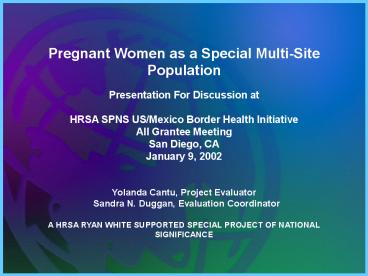Pregnant Women as a Special MultiSite Population - PowerPoint PPT Presentation
1 / 7
Title:
Pregnant Women as a Special MultiSite Population
Description:
At the client level, concerned with identifying and bringing HIV positive ... Significant numbers of HIV Latinas are of child-bearing age ... – PowerPoint PPT presentation
Number of Views:83
Avg rating:3.0/5.0
Title: Pregnant Women as a Special MultiSite Population
1
Pregnant Women as a Special Multi-Site
Population Presentation For Discussion at HRSA
SPNS US/Mexico Border Health Initiative All
Grantee Meeting San Diego, CA January 9, 2002
Yolanda Cantu, Project Evaluator Sandra N.
Duggan, Evaluation Coordinator A HRSA RYAN WHITE
SUPPORTED SPECIAL PROJECT OF NATIONAL
SIGNIFICANCE
2
Border Projects Aims
- At the client level, concerned with identifying
and bringing HIV positive persons into care and
improving health outcomes and quality of life - At the system level, concerned with increasing
the capacity of the system to provide quality HIV
care
3
HIV Pregnant Women and Access
- Access to timely and appropriate HIV care is
critical to good health outcomes for both mother
and baby - Reduced viral loads for mother
- Reduced rates of perinatal transmission
- Standard of Care - Texas Department of Health
data indicate border populations less likely to
receive combination therapy
4
Risk of HIV Infection Occurring in an Infant Born
to a Pregnant HIV-Infected Mother
- Approximately 25 if the woman is not treated
with anti-retroviral medications - The anti-retroviral medication zidovudine (AZT,
ZDV, Retrovir) taken by women in pregnancy and by
their infants postpartum decreases risk to 8 - Other studies have confirmed those results, and
have extended the findings to other medications
and protocols - In South Texas bringing women into care in a
timely manner so that medications could be given
to improve the mothers overall health and reduce
risk of transmission has improved significantly
with periodic break-downs (key indicator of
system capacity)
5
Pregnant Women A Special Multi-Site Population?
- Among Hispanic subgroups Mexican American women
have the highest birth and fertility rates - Care of HIV women (pregnant women in particular)
has been a historical concern in service systems
development - Significant numbers of HIV Latinas are of
child-bearing age - Until very recently, late identification and
entry into care has been the historical
experience of pregnant women and their children
in South Texas
6
Socio-demographic Characteristics
Source of Data Local Intake and Client
Characteristic Form
7
Discussion Items
- At the national level we do not currently track
the numbers of pregnant women entering care - or
who become pregnant - Data about the experiences of HIV pregnant women
along the border are sparse - Do they enter care early in pregnancy? At
delivery? - Are they receiving the standard of care?
- What are the exposure outcomes for their infants?
- What are the other projects doing in this area?
- Would we need to collect data other than
pregnancy status? - Would qualitative studies suffice to explore how
the system works for pregnant women?































